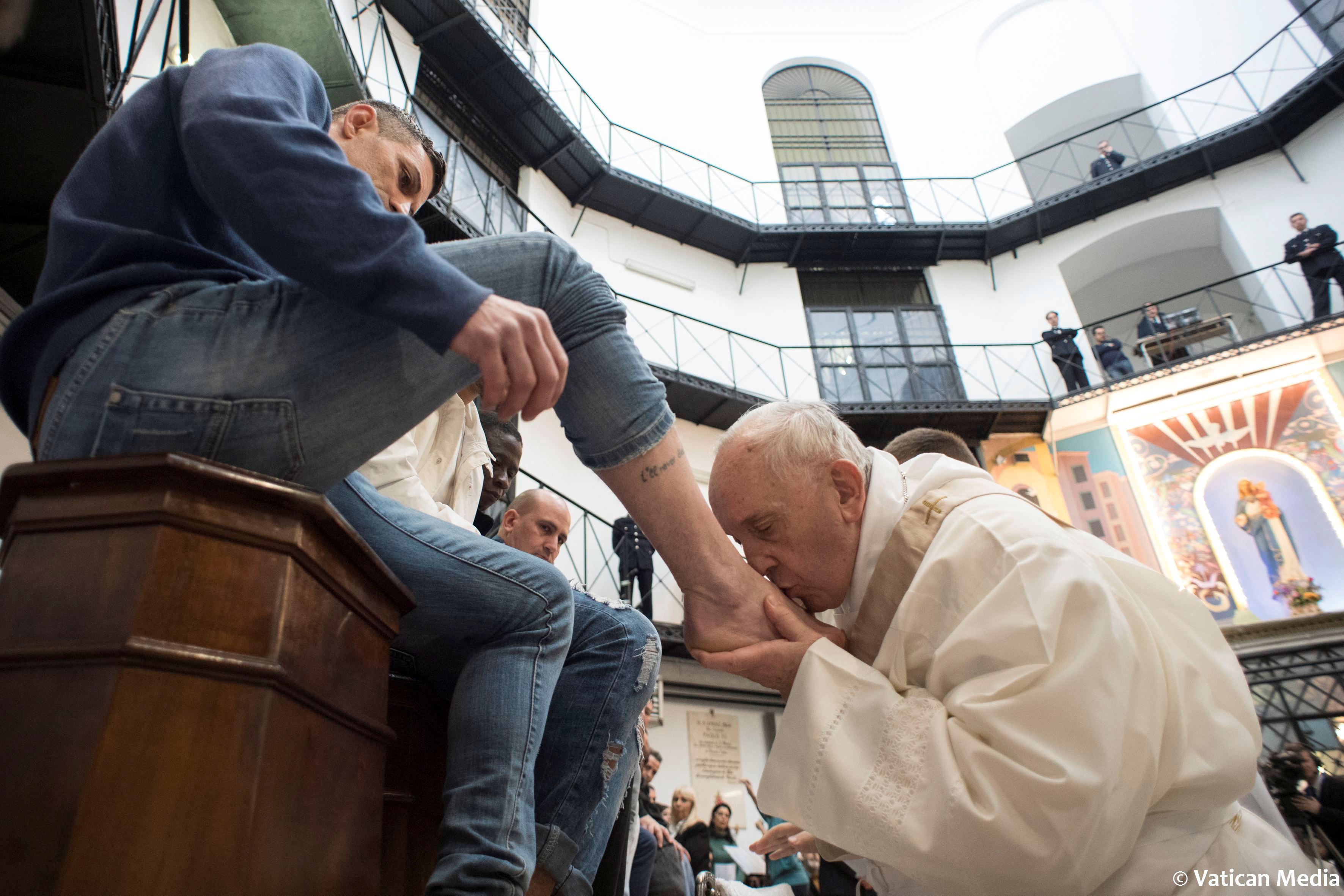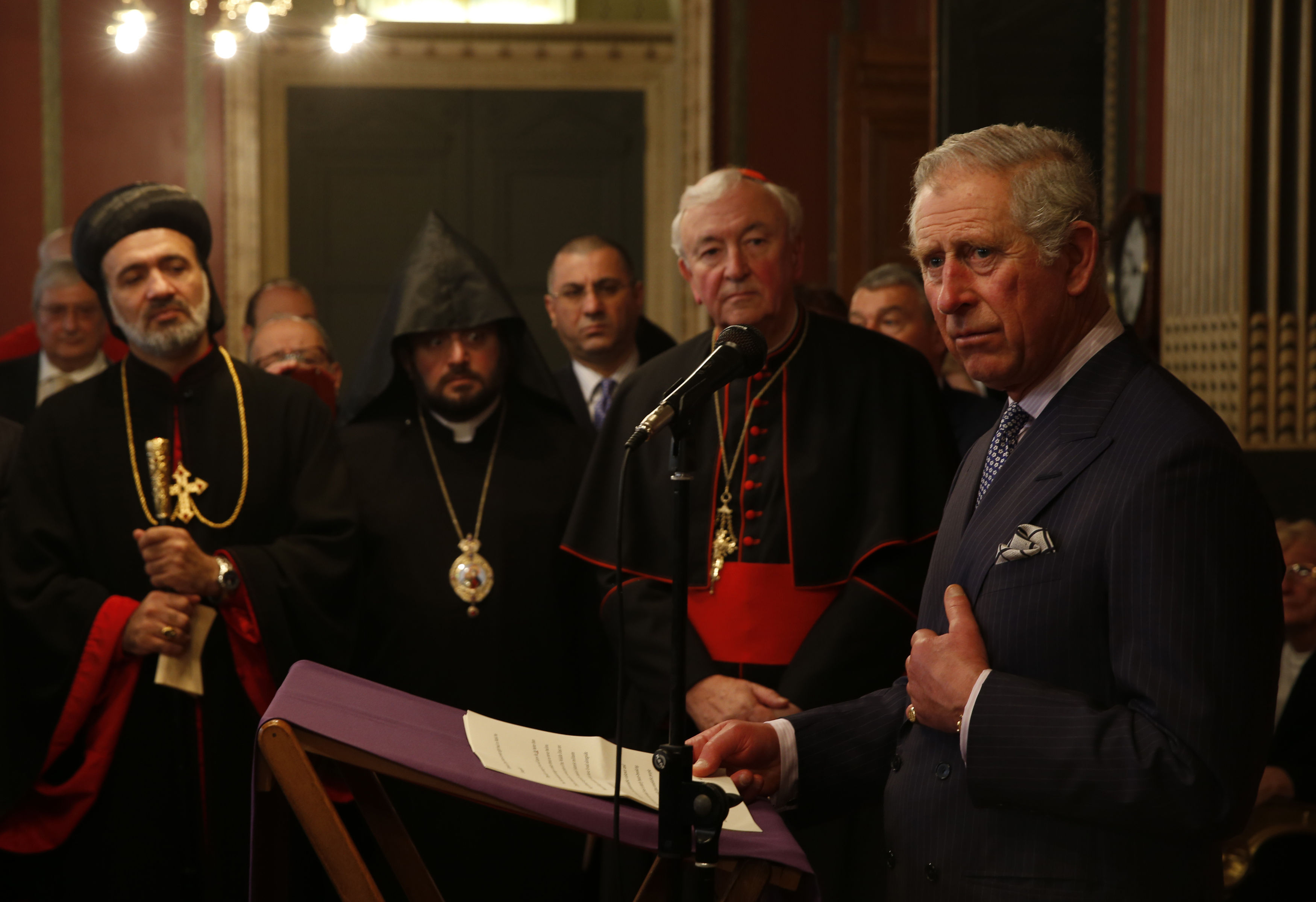The Prince of Wales has recorded a message of support for persecuted Christians around the world.
The message, released in Holy Week 2018, has been inspired by The Prince's recent meetings with Christian Church leaders from the Middle East including the Coptic Pope, the Chaldean Archbishop of Erbil, and the Melkite Archbishop of Zahle and Forzol. It also forms part of his ongoing dialogue with Church leaders in the UK.
His message was welcomed by the Archbishop of Westminster Cardinal Vincent Nichols who said: "We should deplore the persecution of any human being. And he's right to draw attention to the fate of Christians, especially in the Middle East. It's also worth remembering today that people will walk through villages like Qaraqosh (in Iraq) which were destroyed by Daesh and they will celebrate again the Easter mysteries."
The Middle East church meetings with the Prince of Wales were facilitated, in part, by the Catholic charity Aid To The Church In Need which publishes regular reports examining human rights’ violations against Christians around the world.
The message was recorded at The Prince of Wales's official London residence, Clarence House, earlier this month.
The Prince of Wales says "Over the years, I have met many who have had to flee for their faith and for their life – or have somehow endured the terrifying consequences of remaining in their country – and I have been so deeply moved, and humbled, by their truly remarkable courage and by their selfless capacity for forgiveness, despite all that they have suffered."
He says his "heart goes out" to all those being persecuted on religious grounds.
He continues: "All three Abrahamic faiths have known and continue to know the bitterness of persecution when religion has fallen into the barbaric grip of those who distort and misrepresent faith."
At Easter, he says, "when our minds are recalled to the suffering of Our Lord two thousand years ago, we think especially of those Christians who are suffering for their faith in many places around the world. I want to assure them that they are not forgotten and that they are in our prayers."
He says he has also heard that in the darkness there are small shafts of light, signs of Resurrection and of hope that, slowly but surely, Christians who have had to flee from their homelands are beginning to return and to rebuild their shattered homes.
"Biblical lands, such as Syria and modern Iraq, were not always places of strife between people of different faiths. For centuries, in many countries, the three great Abrahamic faiths have lived side by side as neighbours and as friends. For example, I have heard how, in Lebanon, Muslims join with Christians at the Shrine of our Lady of Lebanon to honour her together. I know, too, of senior Muftis who believe in the essential importance of the Christian faith to maintaining the balance of the Middle East."
He refers to the significance of Mary in the Christian faith. "At Easter, as we recall the suffering of Our Lord, we also remember Mary his mother and the torment of grief she endured. Mary occupies a unique and elevated position in both Christianity and Islam. She is the mother of Our Lord and exalted in the Q'uran."
This Easter, he continues, he wants to salute the fortitude of all those who, whatever their faith, are persecuted for remaining faithful to the true essence of their beliefs. "I admire, and greatly respect, all those of you who find it in your hearts to pray for those who persecute you and, following the example of Christ, seek forgiveness for your enemies. Jesus summarises the Ten Commandments into two requirements – that we should love God and love our neighbour as ourselves. It is, therefore, my special prayer this Eastertide that they will be your guide and your inspiration."
Recently the Prince of Wales met Chaldean Archbishop Bashar Warda of Erbil, who has been overseeing the care of more than 100,000 Christians driven out of their homes on Iraq’s Nineveh Plains and Melkite Archbishop John Darwish of Zahlé and Furzol, Lebanon, who is helping Syrian Christian refuges receiving no help from other sources.
These meetings were organised with help from Aid to the Church in Need whose last report, Persecuted and Forgotten? examined human rights’ violations against Christians around the world, highlighting in particular the genocide of Christians in the Middle East and warning that the resulting exodus could threaten the continuing survival of the region’s ancient Churches.
Figures released last Sunday showed 3,249 Christian houses on the Nineveh Plains have been restored out of 12,217 and 37,086 Christians have returned home.
John Pontifex from Aid to the Church in Need said: "For Persecuted Christians and indeed all those who suffer human rights violations simply on account of their faith, the Prince's words of compassion and understanding will be a source of great comfort and hope. The persecuted Christians I have met in Syria, Iraq, China Nigeria, Sudan and elsewhere so often feel nobody is listening to them. With these words from the Prince, they will feel emboldened to live out their faith with renewed confidence and courage."
Pic: The Prince of Wales speaks during an Advent reception attended by religious leaders including Archbishop Athanasius Toma Dawod of the Syriac Orthodox Church (left) and Cardinal Vincent Nichols (second right), the Archbishop of Westminster, at Archbishop House in central London, 2015



 Loading ...
Loading ...